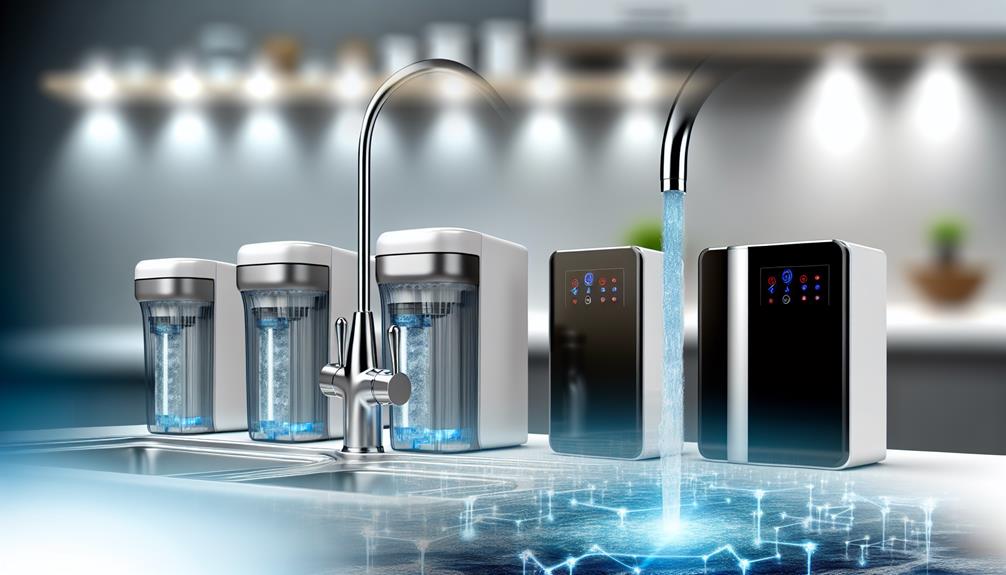Have you ever considered the environmental impact of your water filter? As you strive to reduce waste and minimize plastic consumption, it's essential to turn your attention to the innovations in eco-friendly filtration.
You'll find that the latest advancements offer not only a greener footprint but also promise enhanced performance and longevity. From sustainable filter materials that defy the norms of disposability to energy-efficient systems that cut down on power usage, these solutions are reshaping the way you think about purifying your water.
What's more, the integration of smart technology is transforming filters into intelligent home devices. Stick around, and you'll uncover how to make your water filtration process as kind to the Earth as it is to your health.
Identifying Sustainable Filter Materials
When choosing filter materials, it's essential to consider options like ceramic, stainless steel, and bamboo that offer sustainability benefits, including longevity and minimal environmental impact. These materials not only withstand the test of time, reducing the need for frequent replacements, but they also help in minimizing environmental degradation.
Ceramic, for instance, provides a porous surface for micro-filtration, trapping contaminants effectively without leaching toxins.
Integrating solar-powered or manual pump filters into your system is a stride towards reducing energy consumption. Sustainable doesn't stop with the materials; it encompasses the entire lifecycle of the product. By choosing eco-friendly water filters that are solar-powered, you're not only promoting sustainable living but also cutting down your carbon footprint significantly.
Moreover, sustainable filter materials made from renewable resources, such as wood, nut shells, and bamboo, enhance eco-friendliness. These materials often incorporate activated carbon, which is prized for its ability to absorb impurities. Opting for filter cartridges made from recycled materials further supports this ecological endeavor.
Advancements in Water Filtration Design
Building on the foundation of sustainable filter materials, the latest advancements in water filtration design are setting new standards in eco-efficiency and user convenience. As you explore the realm of sustainable water solutions, it's essential to understand how these technological strides can benefit both the environment and your daily life.
Consider these key developments:
- Energy-Efficient Motors: New water filtration systems employ energy-efficient motors that significantly reduce energy consumption. This innovation not only lowers your electric bill but also diminishes the environmental impact of purifying water.
- Reverse Osmosis Enhancements: Advancements in reverse osmosis systems now feature improved semipermeable membranes, which require less pressure and, consequently, less energy. These systems effectively remove contaminants while remaining cost-effective and eco-friendly.
- Carbon Filter Evolution: The filtration process has been enhanced with the next generation of carbon filters. These eco-friendly filters are designed to last longer and perform better, reducing the need to frequently replace parts and thus minimizing waste.
Energy-Efficient Filtration Systems
Energy-efficient filtration systems stand at the forefront of sustainable water purification, offering significant reductions in energy use and carbon emissions while catering to diverse consumer needs. These systems don't just filter water; they do so in a way that aligns with standards for energy efficiency, often achieving Energy Star ratings that signify their low environmental impact. By using eco-friendly materials and designs, they help you reduce plastic waste, ensuring that you're contributing to a healthier planet.
When you're in the market for water filtration systems that use less energy, consider options like solar-powered units or manual pump filters. These alternatives not only diminish your carbon footprint but also offer independence from the electrical grid. Glass and metal countertop filters, along with ceramic and stainless steel systems, provide durable, eco-friendly products that stand the test of time, unlike their single-use plastic counterparts.
To optimize your contribution to sustainability, it's crucial to evaluate the energy-efficient filtration system's performance, its ability to meet your specific needs, and its maintenance demands. This holistic approach ensures that you're not only accessing safe, purified water but also actively participating in the movement to mitigate environmental impact.
Innovations in Biodegradable Filters
While considering the merits of energy-efficient filtration systems, it's equally important to explore how innovations in biodegradable filters are further revolutionizing our approach to sustainable water purification. These filters are a linchpin in the bid to reduce waste and lessen our environmental impact. By incorporating biodegradable materials, water filters contribute to a sustainable future in several critical ways:
- Minimizing Plastic Waste: Biodegradable filters break down naturally, preventing the long-term pollution associated with traditional plastic filters.
- Reducing Greenhouse Gas Emissions: The production and decomposition of biodegradable filters typically release fewer greenhouse gases, helping to reduce your carbon footprint.
- Using Less Electricity: Manufacturing biodegradable filters often requires less energy, meaning less electricity is used, which is an added environmental benefit.
Your choice to use biodegradable filters is a step towards an eco-friendly lifestyle. You're not only ensuring access to safe, purified water but also supporting eco-friendly filtration innovations that help preserve our planet.
Embracing these environmentally friendly options is a proactive way to reduce reliance on plastics and mitigate the effects of climate change. Choose biodegradable filters to be part of a holistic solution that benefits both you and the environment.
Smart Technology Integration in Filtration
Harnessing smart technology in filtration systems significantly elevates both their efficiency and the overall user experience. By integrating automated monitoring, your water filters can alert you to impending filter replacement needs and maintenance requirements. This not only ensures optimal performance but also reduces the likelihood of unnecessary energy use, which aligns with your environmental goals.
Your filters use sophisticated sensors that work in tandem with smartphone apps, providing you real-time data on water quality. This level of connectivity empowers you to make informed decisions about your water usage and the timing of filter changes. The technical synergy between smart filtration systems and smart home ecosystems streamlines the management process, ensuring that you can maintain high-quality water without manual oversight.
Data gleaned from smart technology integration offers insights that can help you optimize filter performance, ultimately leading to a reduction in the environmental impact of your filtration system. Such data can guide you in adjusting settings to accommodate varying water conditions, preventing overuse and prolonging the life of your filters.
Embrace these innovations to ensure that your filtration system isn't only effective but also sustainable and responsive to your lifestyle needs.

